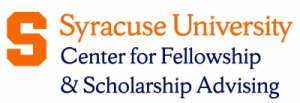Remembrance Scholar Selection Process
Remembrance Scholars are selected according to four criteria: community impact, leadership, creativity, and thoughtful academic inquiry. The Remembrance Scholars should reflect the diversity of academic field of study, race, ethnicity, economic circumstance, gender identity, sexual orientation, religion, disability, and/or record of military service that characterizes Syracuse University’s student body.
An application review committee, made up of five faculty, five staff, and five current Scholars evaluates the Remembrance Scholar applications. The committee holds its first meeting in January to review the mission and goals of the program, affirm selection criteria, and discuss strategies to counter unconscious bias. Committee members are encouraged to take the Harvard Implicit Association Tests (IATs) to become more aware of their own biases.
The committee is then divided into five working teams of three members each (one faculty, one staff, one current Scholar) to evaluate applications.
After all applications have been received at the end of January, applicants’ names are sent to the Office of Academic Integrity and Community Standards to be checked against official records. Applicants with a violation on their record are reviewed by a Judicial/Academic Integrity subcommittee; serious violations are flagged so that working teams may consider them in their evaluation of candidates.
Also in January, all committee members review the complete list of applicants and recuse themselves from reviewing any candidate whom they feel they would be unable to evaluate impartially.
Each working team is randomly assigned ~25 written applications to evaluate and score using a rubric based on the Remembrance Scholar selection criteria.
Individual committee members read and score applications independently, then meet in their teams to produce an aggregate score and comments for each applicant agreed upon by the team. Teams submit their aggregated scores and comments prior to Spring Break. Scores are collected from all teams, statistically normalized, and then candidates are ranked by normalized score.
In late March, the list of ranked candidates is sent to the Provost’s office for final review and the selection of 35 Remembrance Scholars.
